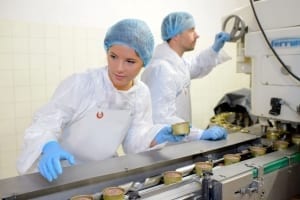Is Your Business Ready to Hire a Small Batch Co-Packer?

It can be difficult to know if your business is ready to hire a small batch co-packer or not. What does a food co-packer do and how do you know if it’s time to hire one?
Keep reading to find out.
What Does a Food Co-Packer Do?
A food co-packer is also called a food contract packer. They are an existing food manufacturing plant that you contract with to produce your food product.
Many small consumer packaged goods companies will use food co-packers as a way to outsource food production.
This can be a game-changer for small businesses because it allows them to focus on the operational side of the business, and marketing and sales.
The fees for a food co-packer will depend on a number of variables. The size of the order, the ingredients involved, the co-packer’s labor and production costs are the main variables.
When you work with a small batch co-packer, you will have several advantages. You’ll be able to maintain high standards of quality. You’ll also have lower minimum order standards to meet.
This can be a great step if you want to move your business out of your small kitchen and you’re not at the point where you need to place a huge amount of orders.
How to Know if You Need a Food Co-Packer
A food co-packer can be a great asset to have if you are ready to scale up your business. How can you be sure that this is the right time to create a partnership with a food co-packer?
Here are some signs that you’re ready to take the next step in growing your food business.
You’re at Capacity
Have you taken your own manufacturing capabilities to the brink? You’ll find that you can only support a limited number of sales.
If you’re at the point where you have more demand for your products than you can handle, then it’s time to find a small batch co-packer.
You Can Scale Your Recipe
You may have initially developed your recipe in a tiny kitchen. You were able to scale it to satisfy more customers and still retain the quality of the final product.
Consumers are demanding healthy food. If your product falls in this category, you need to make sure that your recipe can handle large production runs with healthy, natural ingredients.
When you created your recipe, you may have used approximate measurements and still had great results. It’s much different working with a food manufacturer.
You have to give the manufacturer precise measurements to ensure quality. You have to do the same with cooking times and temperatures. Your recipe should deliver the same exact result no matter who the manufacturer is and which employee is managing production.
Sales Demand
You may be at capacity right now. Do you expect your sales to grow over time? Are your sales seasonal? Co-packers require a minimum run to make manufacturing your product profitable for them.
You may be able to try a test run of 1,000 units with a small batch co-packer to see how fast you sell the product.
That’s only a viable option if your product has a long shelf-life. Keep in mind that you’ll need to absorb storage costs if your sales slow below your projections.
If your product has a short shelf-life, your sales projections have to be as precise as your recipe.
You Have Capital
For businesses that have a significant amount of cash set aside, you can afford to take a financial risk and hire a co-packer.
There are other costs involved in co-packing that can make it challenging. You may have to pay research and development costs to the manufacturer. They will improve the recipe and give it a longer shelf-life.
There may be additional costs if your co-packer supplies the ingredients. At the same time, you may be able to save money if they provide the ingredients because they get a better volume discount.
A food co-packer requires significant investment. You want to make sure that you understand the risks involved before you hire one and you have enough capital on hand.
How to Find a Co-Packer
Do you think that your business is ready to work with a small batch co-packer? You have to find the right food co-packer to work with.
You should start by researching co-packers in your area. Talk to other food producers in your area and ask them how they manufacture their products.
You need to make sure that you find a co-packer that’s the perfect size. A co-packer that’s too large will be difficult to maintain. You’ll outgrow one that’s too small.
You’ll start to understand how food co-packers work and what you need to look for in a co-packer agreement.
The most important thing to know is that you cannot rush the process. Expect to invest at least six months before making a final decision.
A Small Batch Co-Packer Helps Your Business Grow
As a food business, you have to walk a very thin line between having enough inventory and having enough sales to move inventory.
That makes growing a food business a challenge. If you grow your capacity too fast, you don’t have the sales to support it. Grow your sales to fast, you have customers waiting for your product.
Both options can cost money. The best way to grow is to use a small batch co-packer, which gives you more capacity, but not too much. You also maintain quality as you scale your recipe up.
Finding the right small batch co-packer is a big step. You have to know what questions to ask and understand how co-packers work.
Be sure to visit this site often for more business and leadership insights.











Leave a Reply
Want to join the discussion?Feel free to contribute!